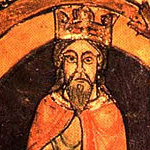When the King of Scotland, the Bishop of Winchester, or the Earl of Gloucester approached her with bended knees to petition for the release of Stephen, she would not rise to receive them, and would frequently dismiss them with a harsh denial. Matilda (Stephen's wife) along with many of the nobility had likewise tried to negotiate with her for the same reason, offering to deliver up not only numerous hostages, but castles and other possessions as well. They even pledged themselves that if restored to freedom, Stephen should renounce the crown and, as a monk or pilgrim, would devote himself to the service of God. The Bishop of Winchester prayed that Stephen's earldoms of Boulogne and Mortain might be conferred on his son Eustace, but the Empress, to their dismay, brushing aside their requests, in her ever-prevailing tone, now demanded large sums of money from them. To this, the nobility urged her to reconsider, as due to the supplying wants of the King, they had lost a large portion of their wealth and were in a state of impending pauperism. It was suggested to her that when the country was in a more tranquil state they would be more able to comply with her demands ... her rage knew no bounds.
The Londoners, she said, had repeatedly and largely supplied the wants of the king; they had lavishly spent their money for his benefit and to her prejudice, and had conspired with her enemies; therefore they had no right to expect that she would spare them, or make the slightest abatement of her demand.Nor did the petition of the citizens for the restoration of the laws of King Edward, instead of those of her fathers, which were found to be too oppressive, meet with a more favourable reception.
CONTINUE READING ->>



.jpg)
